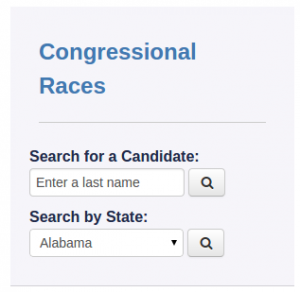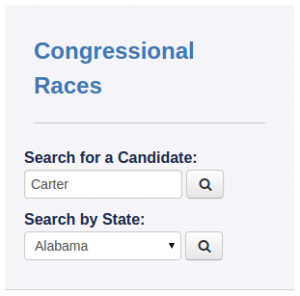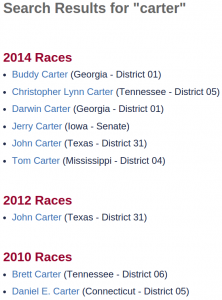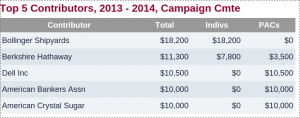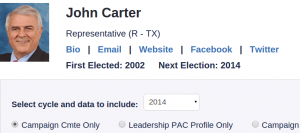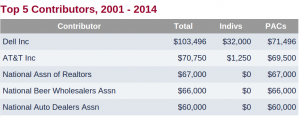I mentioned Rep. John Carter (R, Texas) yesterday, Plumbing the Depths of Abject Stupidity, and I am sure much mirth was had over his misunderstanding of the nature of and need for encryption.
However, all the jests, jeers and humor aren’t going to change Carter’s ignorance nor his highly inappropriate position in the halls of power. All of those things make us “feel” superior to Carter but he is still the one with his hands on the levers of power.
Don’t get me wrong, I laugh just as hard as anyone at Comedy Central / MSNBC (I have trouble telling them apart) but insider humor isn’t going to dislodge anyone from public office. Or threaten to dislodge anyone from public office.
What do we know lies at the heart of success in American politics? Money. Everyone says it often enough and the history of elections bears that out. So if we want to change a position taken by a politician, shouldn’t we influence those that own him?
Finding ownership information for elected Federal officials:
One source of information about money in politics is OpenSecrets.org. There are others so this is just an illustration of hunting for someone to influence Rep. Carter.
Starting at the homepage of OpenSecrets.org, mouse over Politicians & Elections, which will display a drop down menu of choices. Select the first one, Congressional Races. The Congressional Races page loads and displays (in part):
Enter “Carter” only:
Don’t make the mistake I did and enter “John Carter.” You will get “no results.”
The results page displays in part:
The results from OpenSecrets.orgOpenSecrets.org go back to 2004, the first time John Carter was elected to Congress.
Starting with 2014, select “John Carter (Texas – District 31)” and the Summary Data 2014 Race: Texas District 31 displays:
The results page also has “Outside Groups Spending Money in this Race” so you can trace outside money but I haven’t followed it in this example.
If you select John Carter, the Rep. John Carter page loads with a wealth of information.
There are tabs for: Summary (default), Elections, Industries, PACs, Donors, Geography, Expenditures, Legislation, In the News, and, Other Data. The information on the Summary page will suffice for our purposes today but if you are interested, I may return to OpenSecrets.org to explore the other information found there.
Under the default summary tab you will find:
Now we are getting somewhere!
Which is more likely to have an impact on Rep. John Carter, a letter/email/phone call from a non-constituent or a visit from a representative from Bollinger Shipyards, Berkshire Hathaway, Dell Inc, American Bankers Assn, or American Crystal Sugar?
That seems pretty obvious but you can go even further and under the default display:
You can select any individual election to see the top donors or you can select “career” to see the top donors overall:
I think we have a winner!
You would have to check the sort of politics that Dell supports generally but a little “education” on encryption from Dell could go a long way.
If you need other options, check out the top twenty contributors from the 2014 election. Heavy on defense industry types, who have as much to loose from government back doors as anyone.
Financial disclosure records are a first step in making a case for your cause to a member of Congress. Without access, your argument isn’t going to be heard.
The next step is to create a commonality of interest with others. Say the defense industry, pointing out government intrusions could reach erroneous conclusions from materials not read in the proper context. No one wants that to happen with the attendant costs and expenses for lawyers, etc. It is much better for the government to request information so it can be disclosed in a useful and non-misleading way.
Be aware that creating a commonality of interest can include supporting causes you might not otherwise care to see as law. Increased military spending would be one for me. But I would gladly see the DoD budget increased if it mean crippling mass data collection at the NSA, which has already been found to be ineffectual. It’s a trade-off. Everyone wants something and it is a question of finding out what that something is.
(I didn’t cover individual donors but Carter only had four hundred and some odd in 2014. A comprehensive workup would include them and all the PAC donors as well.)
PS: Next year is a major election cycle in the United States. A majority of the seats in Congress are “safe” but that doesn’t mean you can’t leverage existing access relationships. Inquiries welcome.
PPS: I just happened to choose a Republican for this example. The lessons here apply to Democrats as well. Money is a non-partisan participant in American politics.
